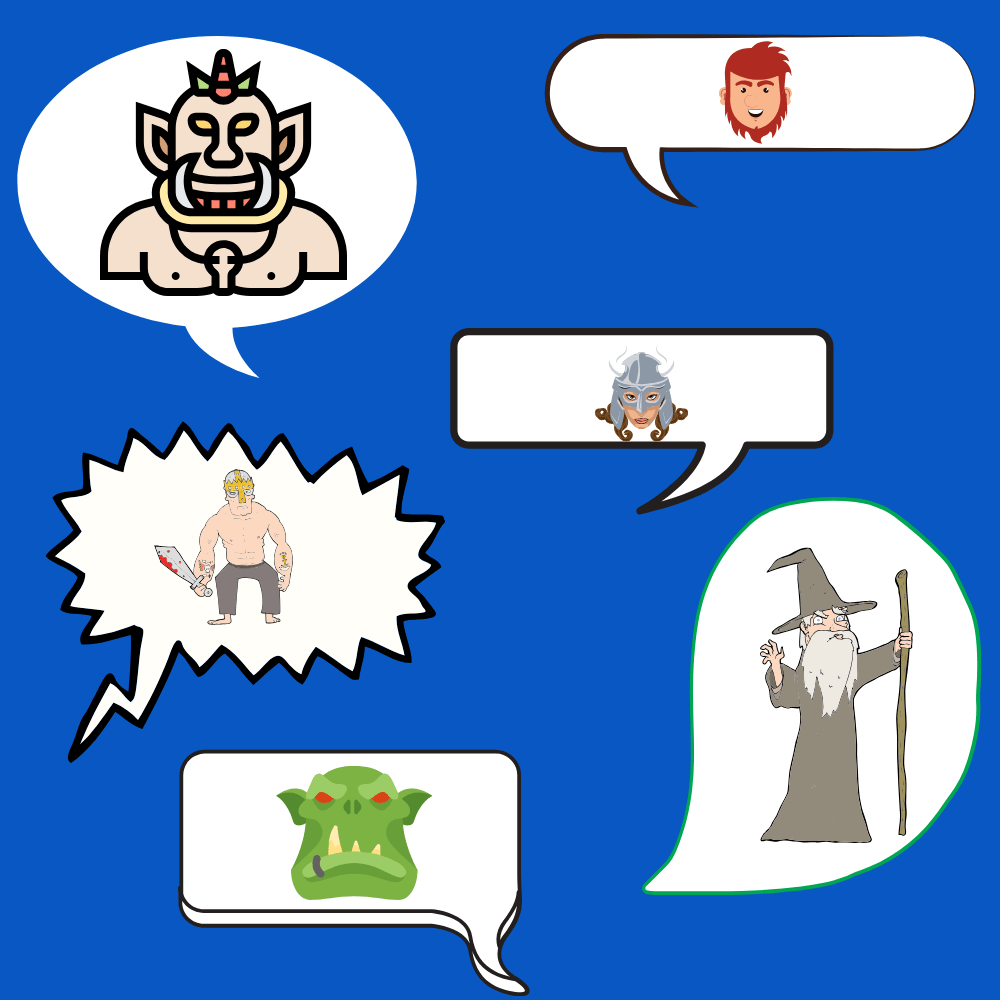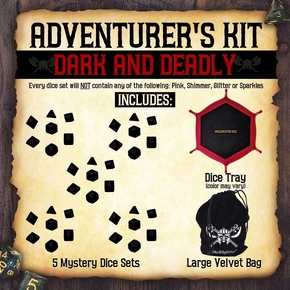
5e Languages
An Overview of 5e DnD Languages
What languages should my character take in D&D? What are the rarest languages?
Table of Contents:
In some campaigns language is seen as a bit of an afterthought while in other campaigns it is going to play a major part. There is one unifying language that is known by all but the most isolated of communities (or certain monster groups who refuse to civilize) known appropriately enough as "Common." The most, well, common of all the common languages, this is almost always seen as the main language of the humans and one that is known in some form by all civilized races live Elves, Dwarves, Gnomes, Halflings, Dragonborn, Tabaxi, and most others. It is the unified way to allow the very necessary practical skill of allowing civilizations to communicate with one another.
Most characters will start out knowing a minimum of two languages, and there are many backgrounds, feats, and other potential backstory pieces that can result in a character knowing many more. Knowing multiple languages can help to solve puzzles in ruins, eavesdrop on a conversation others assume you don't understand, or communicate with isolated tribes or civilizations. Having language as a major part of a campaign, even if only in spurts, can create a really nice flavor, some interesting potential hurdles to overcome, and give use to popular spells like "tongues" or "comprehend languages" that many warlocks, bards, and other casters rely on to be of powerful use to the party.

The "Common" or "Standard" Languages
These are widespread languages that players shouldn't be surprised to run into. Unless otherwise told, chances are that in groups of humans or in any group with multiple races that Common is the language of choice. These are going to be relatively easy to study or learn, and unless a player is playing a customized world/campaign with the DM saying otherwise, all of these should be easy enough to learn or understand.
Common
Common is simple enough as a language and that is why it is the standard language for all humans as well as a default for business between races or in many cities with many different races of people there. Common script is used to write Halfling, though Halfling writings tend to be relatively rare in general and especially so outside of Halfling communities.
Dwarvish

Mainly spoken among Dwarves, this is a language that will rarely be heard outside of groups of Dwarves. However one really interesting thing to note about the Dwarven language, and something anyone running a game as a DM will need to keep in mind on how to deal with, is that the Dwarven alphabet and/or script is used for a variety of different languages including: Dwarvish, Giant, Gnomish, Goblin, Orc, and even Primordial.
No other language's alphabet is so widely used as the written script in the 5e D&D world.
Elvish
The language of Elves, known by both them and Half-Elves as well. The written script for Elvish is not only used with the Elvish language but is also used as writing by Fey creatures who speak Sylvan as well as by any speakers of Undercommon, due in major part to the prevalence of the Drow as one of the power civilizations found in the Underdark. Their language is known for being musical and flowing in nature, as related from its Fey roots.
Giant
Spoken among all races of giants and ogres, giant is also a language that is naturally spoken by more recent added races to the D&D world including Goliaths and Firbolgs. The groups who use this language expands if the player is in a campaign that allows certain monstrous characters as player classes.
Gnomish

Spoken by gnomes, a bit more uncommon of a race in many campaigns, the spoken language is just about gnomes while the script used is Dwarven. This is especially handy for Deep Gnomes in the Undercommon who often know Undercommon and Gnomish as languages, both of which use Dwarven.
Goblin
Many players are surprised that goblins have their own language, but they do. Goblins and other Goblinoid creatures are the only creatures who are going to speak this language and many DMs have goblins who speak or understand at least a broken version of Common.
Halfling
Halfling is an interesting language because despite being listed as a standard or common option, Halflings tend to be very protective of their language and are not prone to teaching it or sharing it with non-Halflings. While known for being social, they are often social in Common or other languages and tend to guard Halfling with all but the most trusted of non-Halfling friends. They also tend to be much more of an oral than written society, which is why they use common for written communication.
Orc

Orc is just that: the language of the many tribes of Orcs. Spoken by Orcs and half Orcs, this is known as a rough and guttural language even among the languages known for being rough. Although violent enemies of the Dwarves, it is actually Darvish script that is used for any written documents - though this is not highly prized among many of the more barbarian tribes so it doesn't come up nearly as often as the spoken language.
The full list of standard languages listed in the Player's Handbook are:
- Common
- Dwarvish
- Elvish
- Giant
- Gnomish
- Goblin
- Halfling
- Orc
The "Rare" or "Exotic" Languages
These languages tend to be much less common and are only found with really specific groups and really isolated areas. Some of these languages have multiple dialects, with the prime example being "Primordial" which also has four dialects based on each of the elements: Auran, Aquan, Ignan, & Terran. That said, each can understand the other although the communication might not be quite as precise as two with the same dialect.
The full list of more "common" Exotic Languages are:
- Abyssal
- Celestial
- Deep Speech
- Draconic
- Infernal
- Primordial
- Sylvan
- Undercommon
Many of these languages are only spoken in places like hell or by demons, by Celestials in heavenly plains, or in places like the Underdark where most travelers don't have any intention of ever traveling. Draconic might be the most common of these exotic languages, especially when Kobolds, Dragonborn, or dragons are involved in a campaign. If a campaign finds its way to the Fey wild then maybe Sylvan comes into play.
However, it also would not be uncommon to play an entire campaign, or several, without ever running into one (or multiple) of these languages! Now that being said, any language that is really specifically tribal or is introduced with a new D&D 5e race like the Aarakocra can be considered as an exotic or unusual language.
Major Language Based Spells
Language is an important enough part of a campaign that there are a couple very common and popular spells dealing with them in the Player's Handbook. Comprehend Languages allows any player to touch a language they don't know whether in ruins, on walls, or on page and allows them to comprehend it for an hour. This isn't limited to one language, but any writing in an hour.
Tongues is the spoken version where a caster can touch themselves or a different creature and that allows it to understand a language being spoke. Furthermore, when that creature or person speaks, others can understand it even when it is speaking in another language.
Note on Thieves' Cant
Most DMs rule that Thieves' Cant is not a "language" per say as a closely guarded cypher. A rogue in any language might say something like "The weather is quite fine today, isn't it, Timmy?" and anyone listening or scrying can understand the words, but without knowing Thieves' Cant they don't know that means "Being followed up to five in party." Thieves' Cant is unique because it's not the words, it is coded talk that really sets it apart and makes sure that magic or not, this is a way for rogues, assassins, and thieves to keep their secrets.
Still confused? Here's a PERFECT example of Thieves Cant. Technically they're from different places, so they get confused, but you should get it now ;p
5e Languages FAQ's
How Long Does It Take to Learn a Language in D&D?
Good question, it’s buried deep in Xanathar’s guide but if you manage to find a trainer willing to teach you a new language, it takes 10 weeks of study (and 25 gold per week so 250 gp) to learn a new language. This time gets cut down a bit if you have a high Intelligence score, and it takes you one less week of study per point of your Intelligence modifier (with a modifier of +2 Int for example, I’d shave off two weeks of study). 10 weeks is a lot, and unless your adventure has a ton of downtime opportunities you’ll likely have to rely on feats if you need to pick up a new language.
What Language do the Undead Speak in D&D?
This is an odd one, and it usually comes up when somebody picks “undead” as a ranger’s favored enemy (and thus should get to learn their enemy’s language). Sadly, in 5e there is no “language of the dead” or anything similar, most undead are either mindless and don’t speak anything, or they speak the languages they knew in life, which could be anything.
If you’re asking merely because you’re curious, most undead don’t speak, and those that do will know the languages they knew in life.
If you’re asking because of the favored enemy issue, it can really go either way depending on how your DM rules it. The only official response from WoTC I was able to find says they don’t speak anything, so the official answer is you don’t get to learn a language when you pick undead as a favored enemy. However, I’ve seen numerous DMs allow rangers to learn Abyssal, or to simply learn any language of their choice. Or, if one of the primary antagonists (a lot of adventures have a vampire or lich as the BBEG) is undead, you can allow your ranger to learn a language they know.
What Language do Mind Flayers Speak?
In a strict gameplay sense illithids (mind flayers) speak Undercommon and Deep Speech. Undercommon is the commonly held language of most creatures in the underdark, and Deep Speech is spoken by aberrations and you can basically think of it as spooky Cthulhu writing.
In Illithid lore they also have a unique racial language called “Qualith” that used to be psionically imprinted onto objects and could only be read magically or telepathically. In 5e it has changed into a sort of “tentacle braille” and it has been relegated to a footnote rather than a full official “Qualith language”.
How Do I Speak Every Language in D&D?
The short and snarky answer is to learn the spells comprehend languages and tongues, viola, you can now understand and speak every language.
But assuming your goal is to simply learn every language that’s no easy task. Not counting some extremely obscure unique racial languages there are 8 “common languages”, 8 “exotic languages”, and a couple “hidden languages” (druidic and thieves’ cant) that will really give us some trouble, for a total of 18 languages in base D&D to learn. There’s a couple ways to go about this:
The first is very boring and will take a lot of time and gold, but if you can find language tutors for each language, you can learn a language with 10 weeks of downtime and 25 gp per week (so typically 250 gp per language). This gets a little easier if you have a high Intelligence (and this seems like a book learning sort of build anyway), so assuming you have an Intelligence of 18 or higher (+4 modifier) each language will only cost you 6 weeks and 150 gp. Simply find your tutors and put the work in.
The second method is to combine a complete hodge podge of class levels and character options for the sole purpose of KNOWING ALL LANGUAGES. This is going to get really complicated and should never actually be built because it’s a Frankenstein’s monster of a multiclass but here we go.
We start simple enough with half-elf as our race which will get us Common, Elvish, and 1 more of our choice (we’re up to 3).
We then take the acolyte background which gets us any 2 of our choice (we’re up to 5).
Our linguist character is going to need to be level 8, and at levels 4 and 8 we’re going to pick feats instead of ASI, specifically the Linguist and Prodigy feats that net us 4 more languages total (we’re up to 9).
Now we get really complicated as we go into class levels.
To start with we take a single level in the Knowledge Domain Cleric which snags us 2 more languages of our choice (we’re up to 11).
Next, we’re going to take 2 levels of druid, specifically Circle of the Shepherd. We need at least one level of druid to pick up that pesky Druidic language and a 2nd level towards Circle of the Shepherd gets us Sylvan (we’re up to 13).
Next we need to learn the other hidden language Thieves’ Cant, we’ll take 3 levels of rogue so that we can pick up some more languages while we’re here by taking the Mastermind subclass for Thieves’ Cant and 2 more of our choice (we’re up to 16).
Finally, we need 2 levels of warlock taking the Seeker Patron with an eldritch invocation at level 2, giving us 2 more languages and reaching our goal of 18!
So, this linguist abomination consists of Cleric 1 /Druid 2 / Rogue 3 / Warlock 2 for an 8th level character that knows all 18 languages in the base game of D&D!
Although, you’ll notice I keep saying base game, there’s some obscure ones that only exist in particular settings or are only spoken by a particular creature. There are ways to nab more languages (the best count I was able to find online was a 19th level character with 24 languages) but I digress. It’s a fun thought experiment but please, if you want to play a linguist, simply pick a casting class and take the comprehend languages and tongues spells.
Is there a "language of the dead" or vampire language in D&D 5e?
Bad news for all of you dhampir players out there. There is not currently a language like that. Although, given centuries or millennia, it would make sense that there should be one. Maybe your DM can invent one!
--
Enjoy this Guide? You May Also Like:
Want to play a hunter with stealth? Check out the Ranger Rogue multiclass guide!
Tabletop gamers everywhere say we have the best dice, get a set for yourself or as a gift!
Thinking about other classes? Check out our other Class Guides for Necromancers and Bards!
New to find a D&D Group? Check out our guide on How to Find a D&D Group.
Want to learn more about the gods in D&D? Check out our Deities 5e Guide
Want to wield two swords like Drizzt? Check out our Two Weapon Fighting 5e Guide!
Looking for a Group? Check out our “How to Find a Dungeons and Dragons Tabletop Group” Guide
Check out the reptilian like race in our Lizard Folk 5e guide

Disclaimer
Last updated: January 27, 2019
The information contained on www.SkullSplitterDice.com website (the "Service") is for general information purposes only.
www.SkullSplitterDice.com is a participant in the Amazon Services LLC Associates Program, an affiliate advertising program designed to provide a means for sites to earn advertising fees by advertising and linking to Amazon.com. (source: Section 5)
Blueshift Nine, LLC assumes no responsibility for errors or omissions in the contents on the Service.
In no event shall Blueshift Nine, LLC be liable for any special, direct, indirect, consequential, or incidental damages or any damages whatsoever, whether in an action of contract, negligence or other tort, arising out of or in connection with the use of the Service or the contents of the Service. Blueshift Nine, LLC reserves the right to make additions, deletions, or modification to the contents on the Service at any time without prior notice.
Blueshift Nine, LLC does not warrant that the Service is free of viruses or other harmful components.
Affiliate disclaimer
This affiliate disclosure details the affiliate relationships of Blueshift Nine, LLC with other companies and products.
Some of the links are "affiliate links", a link with a special tracking code. This means if you click on an affiliate link and purchase the item, we will receive an affiliate commission.
The price of the item is the same whether it is an affiliate link or not. Regardless, we only recommend products or services we believe will add value to our readers.
By using the affiliate links, you are helping support the Service, and we genuinely appreciate your support.
Affiliate advertising programs that the Service uses are:
- Amazon Services LLC Associates Program
- As an Amazon Associate, I earn from qualifying purchases.
- Blueshift Nine, LLC is a participant in the Amazon Services LLC Associates Program, an affiliate advertising program designed to provide a means for sites to earn advertising fees by advertising and linking to Amazon.com or endless.com, MYHABIT.com, SmallParts.com, or AmazonWireless.com.
- Pages on this Service may include affiliate links to Amazon and its affiliate sites on which the owner of this Service, Blueshift Nine, LLC, will make a referral commission.
